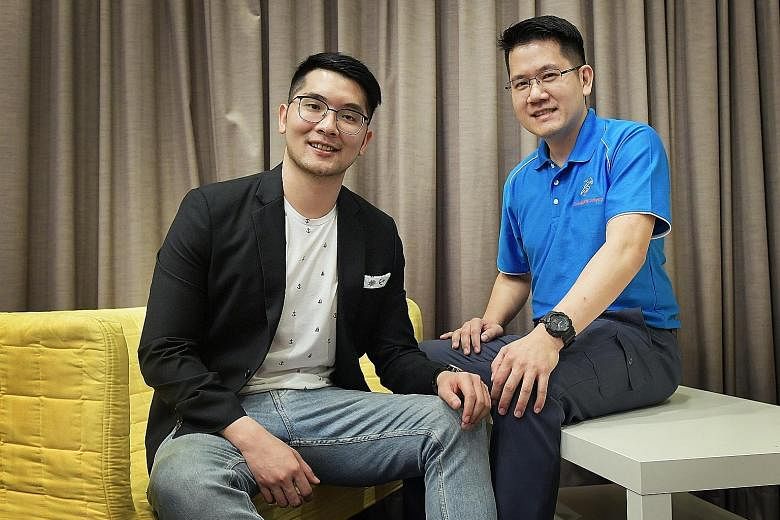While in rural Thailand on a motorcycle trip in 2013, Mr Desmond Lim, 41, was run over by a huge truck - first the front then the back wheels rolled over his body - fracturing his spine and pelvis.
Lying on the road crushed and in excruciating pain, he remained conscious for the longest six or so hours of his life - the time it took for an ambulance to arrive.
The former flight steward was on a trip with two friends, riding his motorcycle from Singapore to Laos and back.
He was mowed down by the truck when he stopped at a traffic light outside Bangkok.
"The pain was so bad and I was bleeding so badly, but I could not move," he said.
The horrific accident left him not only with a fractured spine and pelvis, but also a snapped urethra, among other injuries.
He needed seven operations, including several skin grafts as the truck's tyres had ripped his skin.
He spent the next 18 months at the Singapore General Hospital (SGH) recovering.
A month or two into his hospital stay, his doctor told him that he would never walk again. And for the first eight to nine months, he could not even sit up on his hospital bed without help.
"What do I do with my life now," the once-active, avid traveller had asked himself. "I lost all hope and became very depressed."
At the time, he needed help with the smallest tasks, such as taking a shower. Despondent, he told his girlfriend of seven years to leave him and said all manner of "hurtful words" to end their relationship. They broke up eventually.
Said Mr Lim: "If she were my daughter, I would not want her to go out with a man like me, who could not even sit up (without help) then."
Although people around him were loving and encouraging, he felt that no one - not his family or friends or the medical staff - could understand his agony and trauma.
He was in constant pain, experiencing nerve pain that felt like "electric shocks" shooting through the lower half of his body, and had to swallow up to a dozen painkillers daily to cope.
He thought of death constantly, but was physically unable to kill himself. Besides, his family's love kept him going. So did encouragement from the hospital staff.
And as he recovered, reading stories about those with disabilities who did well in life despite their challenges also gave him hope.
Defying the doctor's diagnosis, he recovered his ability to walk unassisted about three years after the accident. However, he now walks with a limp.
As part of his efforts to be independent after his discharge from hospital, he would walk up and down the stairs from his 11th-storey flat almost every day.
It took him up to 4½ hours to do that.
But he did it, even though his pelvic bone remained tilted at an angle after the accident, making one leg about 3cm shorter than the other and calling for a thicker sole to even out the height difference.
The pain is still there, although it is more manageable, and he is still haunted by flashbacks of the crash.
About 2½ years after his accident, he started working for a firm selling prosthetics and came into contact with those who needed artificial limbs.
He realised that he could provide emotional support to patients as he, too, had suffered major trauma.
So Mr Lim suggested to SGH medical staff that it would be helpful to start a support group for trauma patients, such as those who survived traffic or industrial accidents.
Late last year, the hospital set up a trauma support group with a befriending service.
Volunteers in the group, like Mr Lim, share their experiences with other patients and encourage them.
The group is led by survivors and supported by hospital staff. It plans to organise informal gatherings for members and to train them to reach out to other survivors.
Ms Annabelle Ip, an SGH medical social worker, said the peer-led support group for trauma patients is believed to be the first here.
She added: "It helps new survivors to know they are not alone in their experience, and we try to instil a sense of hope that they can manage somehow."
Mr Lim, who now runs his own company supplying prosthetics, first reached out to a young man who survived a motorcycle accident in Cambodia that had left him with multiple injuries (see other report).
Mr Jason Lim, 27, said: "I had 108 friends who visited me in hospital but I still felt alone, like no one could relate to my worries and tell me what it will be like in the future.
"I felt Desmond understood and that gave me comfort and emotional support.


